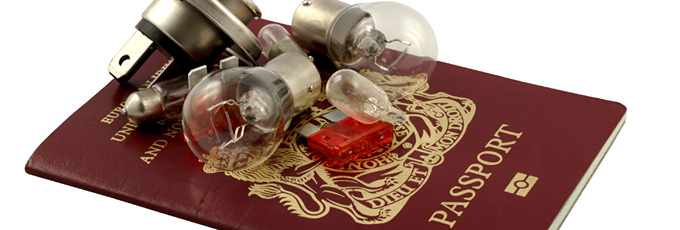How To Stay Legal When Driving in France This Summer
July 13, 2015 | Fun Tips | Money Saving Tips | 2 comments
Soon thousands of British motorists will be heading down to Dover to catch a ferry across to France, before spending two weeks on the Languedoc coast, exploring Bordeaux or basking in the cosmopolitan aura of Paris as part of their summer holidays.
If you are one of those, before heading off on your holidays it’s important to make sure you are fully aware of the legal requirements when driving in France, as this will make all the difference to you enjoying your two-weeks away or facing a hefty on the spot fine – and potential penalty points on your licence.
To help you enjoy your travels, at BuySpares we’ve compiled a list of not only some of the checks you should carry out on your car, but some of the main legal requirements you need to consider.
Avoid on the Spot Fines:
- Important documents – when driving in France, you need to make sure you have a full valid driving licence, proof of insurance (third party or above), proof of ID (passport) and the V5C Certificate.
- GB Sticker – this must be clearly displayed on the rear of your car, either in the rear window or on the exterior of the vehicle. [source: eurotunnel.com]
- Breathalyser – since 2013 it has been a legal requirement for a NF approved breathalyser to be carried in all vehicles. It’s also worth noting that the drink drive limit in France is significantly lower than it is in the UK (0.5mg per ml in France, compared to 0.8mg per ml in UK), and the Police do carry out random checks. [source: eurotunnel.com]
- Warning Triangle and Reflective Jacket – in the case of an emergency or breakdown, a warning triangle must be in use, and a reflective jacket needs to be worn. The jacket should be kept within the passenger area of the vehicle. Failing to have a warning triangle in the car will result in a €135 fine and failure to have a reflective jacket can result in a €90 fine. [source: eurotunnel.com]
- Headlamp convertors – these are compulsory when driving your vehicles in France to prevent the dazzling of other road users. Failure to have these on your vehicle can result in an on the spot fine. Failure to have these on your car will run the risk of facing an on-the-spot fine of €90.You should also have spare bulbs within your car, if you don’t you run the risk of an €80 fine.
Other Legal Requirements Worth Noting:
Along with making sure you have the correct paperwork and driving accessories when driving in France, there are other legal requirements you need to make sure you are aware of, these include:
- Full valid UK driving licence – the minimum age to be able to drive a car or ride a motorbike in France is 18 years old. [source: rac.co.uk]
- Make sure your radar detectors, such as those which are inbuilt into Sat-Navs and detect speed cameras, are turned off. Since late 2011, such detectors have been banned and if caught with one, you can face a fine of up to €1500 and 6 points on your licence. [source: onecalldirect.co.uk]
- Children under the age of 10 are not permitted to travel in the front of the vehicle. Instead, they should be in the back, with a suitable child seat. [source: theaa.com]
- Any on the spot fines issued must be paid in cash, in the correct currency and to the arresting officer. Credit cards and travellers cheques are not accepted for such fines.
- In built up areas, the use of horns is prohibited, unless necessary to avoid an accident.
- Mobile phones, even with a “hands-free” systems should not be used. You can face an on the spot fine if caught. [source: justlanded.com]
- If you wear glasses, you’re required to have spare pair in the car. [source: drive-france.com]
Car Maintenance:
Along with ensuring you are aware of the legal requirements when driving in France, it is also important to make sure your car is up to the task. This will significantly reduce the risk of you breaking down, meaning you can enjoy your holiday without any unforeseen mishaps.
A common cause of breakdowns is a flat / punctured tyre, and this can be caused by driving on tyres which aren’t correctly pumped up. Too low tyre pressure also has unfavourable effects on your petrol consumption, and the handling and braking distance of your vehicle.
Ideally, you should check your tyre pressures on a monthly basis, when your tyres are cold. Whilst the pressure will vary from manufacturer and model, you can easily check yours – wherever you are – by using the Rolson Digital Tyre Pressure Gauge, which provides readings in PSI and BAR on a clear LCD display.
Before travelling you should also check your tyres are road legal and you have the correct level of oil and coolant in your car. The latter two will help prevent your engine from overheating and will keep your car running. We also recommend packing jump leads and a torch in your vehicle, in case you are unfortunate enough to find yourself broken down.
By making sure you and your car are prepared for your travels, you can help ensure you enjoy your family holiday – and make memories for all the right reasons.
Tags: Driving Tips, Money Saving Tips








2 Comments
chris
July 19, 2015 | 15:15 -
Warning Triangle and Reflective Jacket – one jacket per person (4 people = 4 jackets)
GB sticker – or EU registration plate endorsed with the GB (not England / Wales / Scotland)
Breathalyser – this is still contentious – as the French drivers do not have to – please check
Buying fuel – be aware that Biodiesel (yellow nozzle) is not of the same quality as Gazol (black nozzle).
My diesel injectors were subject to a full tank of biodiesel, and despite full service before leaving UK, they failed on power when returning on motorway.
in UK diesel jet cleaner and two full tanks of diesel later, sorted this out. A costly mistake (7p a litre cheaper, but over £10 for the diesel jet cleaner left me out of pocket. Never again.
Mike
July 22, 2015 | 17:32 -
Hi Chris, many thanks for your feedback and for joining in the conversation on this blog.
I wasn’t aware the reflective jacket referred to all passengers, as far as I understood it the driver must have one in case of an emergency, and it should be kept on the passenger side of the car, not in the boot – although there’s no harm in having one for every person in the car. As for the breathalyser, as I understand although the implementation of a fine has been postponed (for now) it is still highly advisable to have at least one unused one in the vehicle, which shows the French certification mark NF.